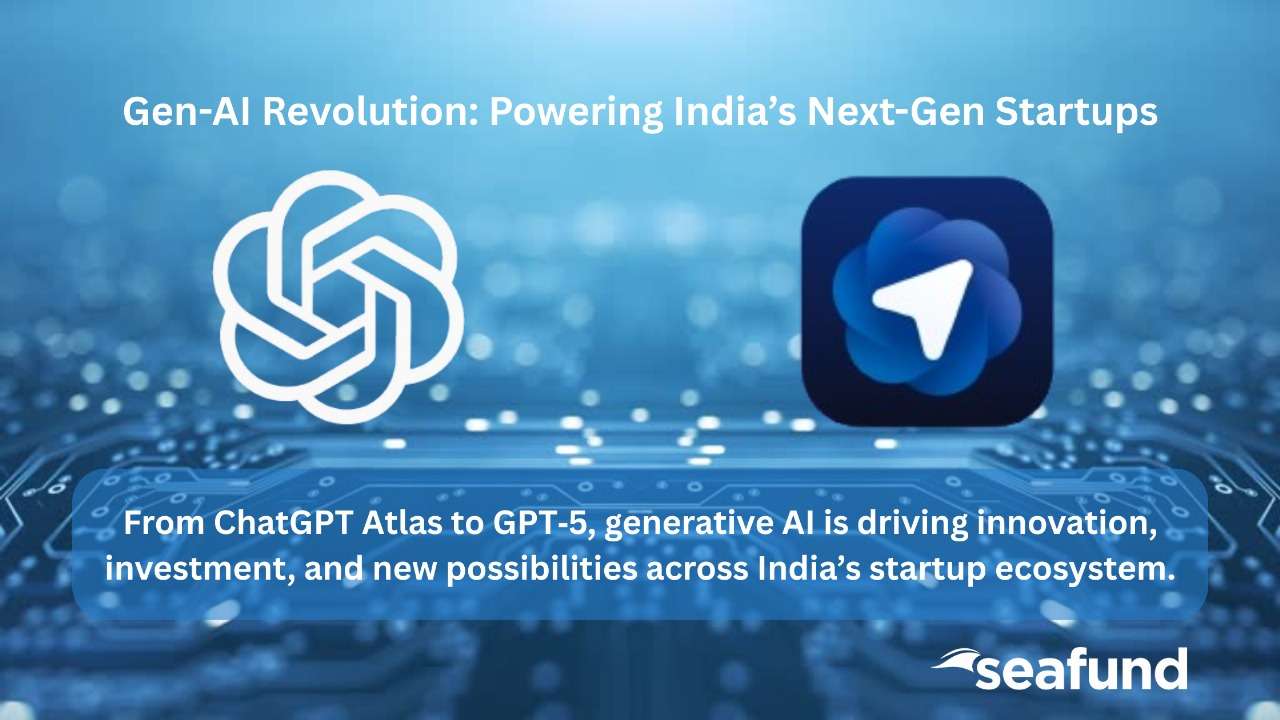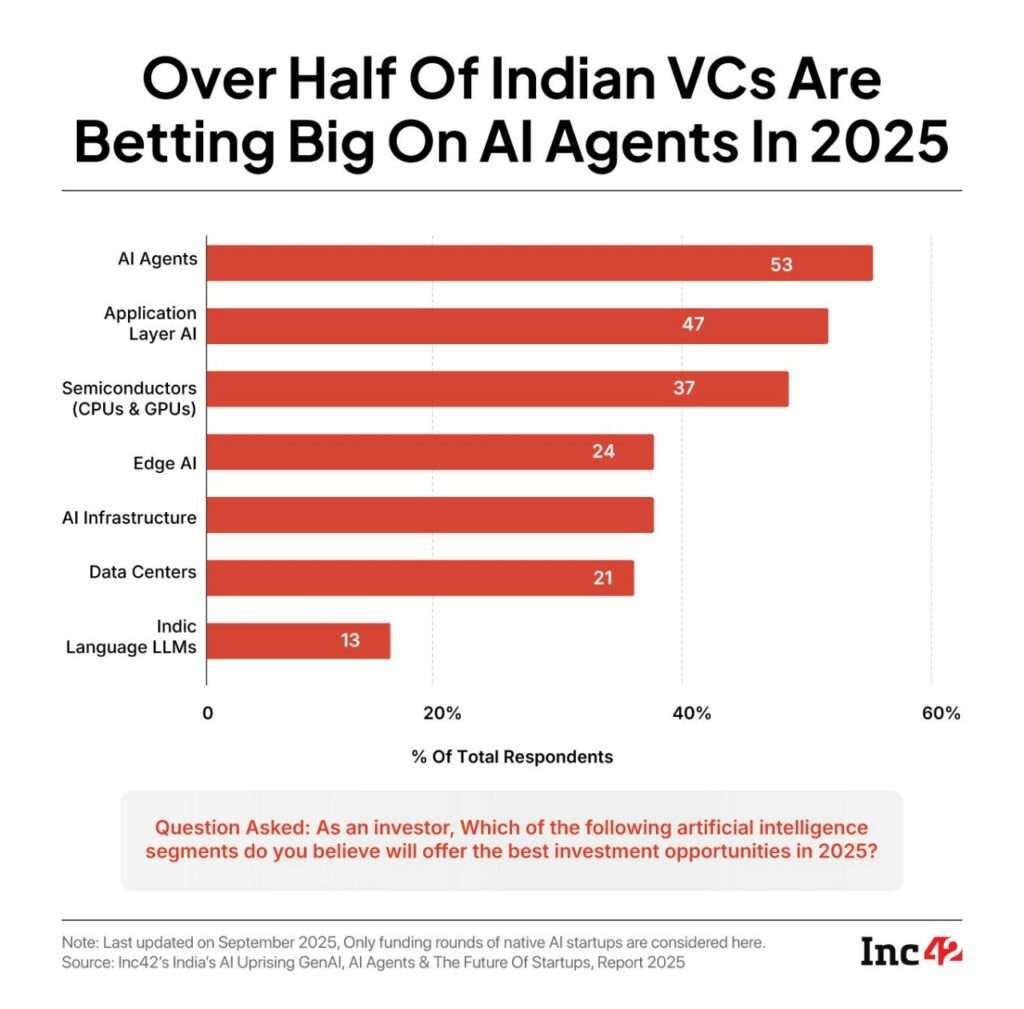Beyond ChatGPT: How GPT-5 and ChatGPT Atlas are Unlocking Generative AI Startup Opportunities in India

Introduction – The Rise of GPT-5 and ChatGPT Atlas
The generative AI wave is no longer confined to sci-fi speculation: we’ve entered the era of GPT 5 and advanced GenAI, and it’s set to rewrite how startups build, operate and scale. While the world watched ChatGPT make conversational AI mainstream, the next frontier is about foundation models, multimodal intelligence and verticalised agents that go beyond text to reasoning, images, speech and domain-specific workflows. As Marc Andreessen, the renowned VC, said:
“Software is eating the world. Generative AI is eating software itself.”
Globally, generative AI startups raised around US $10 billion in 2023, despite a broader venture-funding slowdown. India is no exception. According to NASSCOM, the country’s generative AI (GenAI) ecosystem more than tripled in size from H1 2023 to H1 2024: rising from ~66 startups to over 240. The narrative is clear: if the future is AI-native, then GenAI represents a tectonic shift — especially for early-stage founders and venture capital firms looking to fund startups in India.
The rise of ChatGPT Atlas amplifies the possibilities: founders can now build solutions that combine cutting-edge language models with dynamic information retrieval, making products more responsive, accurate, and scalable. Unlike traditional language models, ChatGPT Atlas doesn’t just generate responses based on static training data—it can access live web information, interpret it contextually, and reason over dynamic content. This transforms how AI-powered products are built, enabling smarter decision-making, more accurate recommendations, and up-to-date insights.
For an early-stage venture capital firm like Seafund, this moment offers both opportunity and responsibility: to identify the founders building the foundational pieces of this new stack, to support them with capital and expertise, and to help shape the generative AI wave in India.
Startup Use-Cases: GenAI across Sectors
Generative AI isn’t a monolithic technology — its power lies in how it’s applied. Here are some of the most compelling use-cases relevant to startups in India:
- Healthcare
Startups are using GenAI to automate clinical documentation, generate plausible treatment options, interpret medical imaging and create virtual care assistants. With GPT-5 enabling multimodal understanding (text + image + speech), the potential grows. For instance, India’s GenAI ecosystem saw healthcare startups raise meaningful capital in H2 FY25. A noted investment: Jivi, an AI-healthcare firm in India, backed by US funds including the AI Fund. - Finance & Fintech
GenAI is being used for risk assessment, compliance automation, investor advisory, and generative fraud detection. One Indian fintech infrastructure startup, Neurofin, raised US $1.6M seed funding to build a GenAI-powered compliance platform in BFSI. - Legal, Compliance & SaaS
Verticalised AI-first startups are emerging in contract review, policy summarisation, legal workflows and document generation. For example, Indian startup Spotdraft reportedly raised ~US $60 m in H2 FY25 for its legal-tech GenAI stack. - Logistics, Manufacturing & SaaS
In the enterprise domain, GenAI can interpret sensor data, automate supply-chain optimisation and generate workflows. Combined with GPT-5’s reasoning capabilities, this opens opportunities for startups building “AI copilots” for industrial workflows and productivity software.
| Sector | Use Case Example | Benefits |
| Healthcare | AI-assisted diagnostics, telemedicine | Faster diagnosis, personalized care |
| Finance | Fraud detection, AI advisory | Reduced risk, improved customer service |
| Legal | Contract analysis, automated research | Efficiency, reduced errors |
| Logistics | Route optimization, inventory management | Cost reduction, real-time decisions |
| SaaS | AI-driven analytics, automated customer support | Productivity gains, insights-driven |
Why This Matters for Founders
- Speed to value: GenAI enables faster product iteration, prototyping and deployment.
- Differentiation: Building a domain-specific GenAI model or agent creates defensible moats.
- Scalability: Unlike traditional software, GenAI products can scale via models, data and usage.
- Global relevance: Indian teams can build for global markets (especially non-English bilingually) while addressing local complexities.
Challenges to Consider – and Overcome
Of course, opportunities come with caveats. Founders and investors need to keep these challenges at the top of the agenda:
- Compute & Cost
Training and deploying large language models (LLMs) and multimodal models (like GPT-5) require GPU clusters, substantial infrastructure and ongoing tuning. Many Indian startups struggle with cost structure and access to resources. - Data Privacy, IP & Ethics
GenAI relies on massive data ingestion. India’s data-protection ecosystem is still evolving. Ensuring data privacy, proper consent, model auditing and bias mitigation is more than compliance — it’s foundational for trust. - Regulation & Responsible AI
With accelerated adoption, regulation is catching up. Founders must anticipate frameworks around AI governance, accountability and transparency (for example, when models make decisions). - Product-Market Fit & Realisation
A report from MIT found that ~95% of GenAI enterprise projects were not delivering meaningful outcomes, despite large hype and funding. For startups, this means the emphasis must shift from “model size” to solution fit, domain depth and user adoption. - Talent & Infrastructure
Access to AI talent, especially for deep-model work (LLMs, MLOps, multimodal) remains constrained. Indian startups must often partner for infrastructure or leverage hybrid global talent.
Investor Insights: The Appeal of GenAI Startups
As Sundar Pichai puts it:
“Generative AI is a new wave of computing — and India is well-positioned to ride it.”
Key drivers for investor interest include scalability, market demand, and a strong talent pool of AI researchers and engineers.
From a venture-capital perspective, here’s why GenAI is commanding attention:
- Early-Stage Momentum: In India, 77 % of GenAI funding rounds in Q2 FY25 were angel/seed. This means plenty of runway for early-stage VC firms.
- Sticky Value Creation: AI products often lead to value compounding — the more data and usage, the stronger the moat.
- Platform Opportunity: Many GenAI startups don’t just sell features; they build models, platforms and APIs that can monetise horizontally.
- Global Leverage: An Indian GenAI startup can serve local language markets or global ones, yielding a larger market opportunity.
- Talent arbitrage: India offers engineering talent at scale, making it cost-effective relative to Silicon Valley for model development and deployment.
- Upward funding trajectory: According to NASSCOM, GenAI startup funding in India rose from US $59 m in H1 FY25 to US $176 m in H2 FY25 — a ~3× jump.

Source: Inc42 Media
For VC firms looking to invest in startups in India, and specifically those targeting GenAI, this is a high-conviction area. Early-stage venture capital firms, especially those specialising in deep-tech and AI, are thus strategically positioned.
- Rapid ecosystem growth: From 66 GenAI startups in H1 2023 to over 240 by H1 2024 — a 3.6× jump. Read More
- Growing funding flows: Cumulative funding of $750 million+ for Indian GenAI startups since 2023.
- Global ranking: India ranks 6th globally in GenAI startup ecosystem share.
- Deep talent pool & language advantage: With thousands of PhDs, engineers and multilingual markets, India offers an edge when building models for Indic languages and global scale.
- Entrepreneurial drive: Cities like Bengaluru, Delhi and Mumbai host thriving deep-tech hubs with access to early-stage venture capital investors in India. Firms with offices across these cities are actively seeking to fund startups in India.
- Local market + global ambition: Founders can build for Indian use-cases (languages, enterprise complexity) and expand globally — giving VCs an interesting macro-play.
Actionable Guidance for Founders & Fundraisers
If you’re a founder or early-stage startup targeting the GenAI wave, here’s a blueprint:
- Start with a vertical pain-point: Whether in healthcare, legal, manufacturing or compliance — domain depth matters.
- Prototype fast, iterate faster: Use app-builders or GenAI scaffolds (consider referencing tools like Lovable / Emergent) and integrate GPT-5-style capabilities (e.g., see ChatGPT Atlas / OpenAI’s roadmap) to test.
- Explore the official ChatGPT Atlas announcement for model capabilities.
- Explore the official ChatGPT Atlas announcement for model capabilities.
- Validate usage & metrics: Focus on retention, RUUs (returning users), value per user and data-feedback loops.
- Built for scale: Design your product with model upgrades, data pipelines and MLOps in mind.
- Fund-raise smartly:
- Prepare a pitch deck that outlines market size, model differentiation, data-moat and go-to-market. Uber Pitch Deck: A minimalist approach focusing on the problem, solution, and market opportunity. Check out the pitch deck here. These decks emphasize clarity, scalability, and a strong value proposition—key elements for any GenAI startup seeking investment.
- Target early-stage venture capital firms in India (angles: SaaS + AI, enterprise workflow, vertical GenAI).
- Showcase traction (pilot metrics, early revenue, enterprise partnerships).
- Plan for cost & regulation: Be clear on compute cost strategy, regulatory compliance (data privacy, localised models) and ethical guardrails.
- Leverage ecosystem: Tap into accelerators, incubators, Indian AI networks, and cloud-credits programs.
Seafund’s Commitment to AI-Native Startups
At Seafund, we believe the future belongs to those who build AI-native companies — not simply adding AI as a feature, but embedding GenAI at the core of their business models. We are focused on early-stage deep-tech investments across India, particularly in Bengaluru, Delhi and Mumbai.
If you are building a startup with generative AI — leveraging GPT-5 or beyond, targeting a vertical domain, and aiming to scale globally — we would love to hear from you. We bring capital, network and domain expertise to help you navigate the challenges of compute, model development, product-market fit and scaling.
Pitch your startup to Seafund today and let’s shape the future of India’s GenAI ecosystem together.
Conclusion
The generative AI revolution is shifting from “what could be possible” to “what startups are shipping”. With GPT-5 and its successors becoming accessible, India’s moment has arrived. To founders: build with conviction. To investors: back bold. And to all ecosystem players: the time to act is now — because in GenAI, the early innings matter.
Let’s unlock the next wave of growth in India — where innovation, startup funding, venture capital and generative AI converge.
FAQ’s
- What is GPT-5 and how is it different from ChatGPT?
GPT-5 is OpenAI’s latest generative AI model, offering advanced reasoning, multimodal understanding (text, images, speech), and domain-specific capabilities. Unlike ChatGPT, it can perform complex tasks across multiple industries and integrate with tools like the Atlas browser for real-time information retrieval. - How are Indian startups using Generative AI?
Startups in India are leveraging GenAI for healthcare, finance, legal, logistics, and SaaS, including automating workflows, generating insights, improving customer support, and building AI copilots for enterprise applications. - What challenges do GenAI startups face in India?
Key challenges include high compute costs, data privacy and compliance issues, regulatory uncertainty, talent shortages, and ensuring product-market fit for AI solutions. - Why are GenAI startups attracting investors?
GenAI startups offer scalability, high growth potential, and value compounding as models improve with usage. Early-stage venture capital firms see strong ROI opportunities in India’s rapidly growing AI ecosystem. - How can founders get started with AI-powered startups in India?
Founders should focus on vertical-specific problems, validate solutions quickly, leverage AI tools like ChatGPT Atlas, prepare investor-ready pitch decks, and engage with early-stage VC firms to secure funding and guidance.
Table of Content
- 1. Introduction – The Rise of GPT-5 and Generative AI
- 2. Startup Use-Cases: GenAI across Sectors
- 3. Challenges to Consider – and Overcome
- 4. Investor Insights: The Appeal of GenAI Startups
- 5. India's GenAI Startup Ecosystem
- 6. Actionable Guidance for Founders & Fundraisers
- 7. Seafund’s Commitment to AI-Native Startups
- 8. Conclusion
- 9. FAQs

